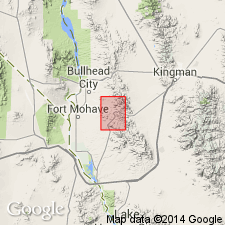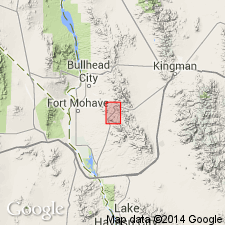
- Usage in publication:
-
- Oatman andesite*
- Modifications:
-
- Named
- Dominant lithology:
-
- Andesite
- AAPG geologic province:
-
- Plateau sedimentary province
Summary:
Named for the town of Oatman, sec 14, T19N, R20W, Mohave Co, AZ in the Plateau sedimentary province. No type locality designated. Erupted after the Esperanza trachyte (new) and before the Gold Road latite (new). Rests locally on Alcyone. Is a series of flows, intrusive into the Alcyone trachyte (new). Thickness not determined; estimated to be about 2,700 ft thick. Composed of green chloritic andesite, uniform in character, more porphyritic than underlying rocks and amygdaloidal (cavities filled with calcite, quartz, chlorite, zeolites). Has a few lenticular layers of greenish-gray, tuffaceous, soft, crumbly sandstone which represent intervals of erosion or deposition between eruptions. Consists essentially of feldspar (andesine to labradorite), augite, biotite, apatite, and magnetite in a groundmass of glass crowded with small crystals of feldspar. Biotite is rarely fresh, usually altered to chlorite. Chemical analysis. Approaches latite in composition. Geologic map. Cross section. Tertiary age.
Source: GNU records (USGS DDS-6; Denver GNULEX).

- Usage in publication:
-
- Oatman Andesite*
- Modifications:
-
- Age modified
- Overview
- AAPG geologic province:
-
- Plateau sedimentary province
Summary:
Ranges in composition from dacite to andesitic basalt, but averages subalkalic latitic andesite. Consists of flows, tuffs, and flow breccias. Typically has 55 percent groundmass, 45 percent phenocrysts of plagioclase, orthopyroxene, and clinopyroxene. Overlies Alcyone Formation (redescribed). Estimated as 300 m thick. Mapped (geologic maps) in north and south of Oatman, Mohave Co, AZ in the Plateau sedimentary province. Overlies Esperanza Quartz Latite (redescribed). Underlies Gold Road Dacite (redescribed). Erupted between 19 and about 23 Ma. Age modified from Tertiary to Miocene. Chemical analyses.
Source: GNU records (USGS DDS-6; Denver GNULEX).
For more information, please contact Nancy Stamm, Geologic Names Committee Secretary.
Asterisk (*) indicates published by U.S. Geological Survey authors.
"No current usage" (†) implies that a name has been abandoned or has fallen into disuse. Former usage and, if known, replacement name given in parentheses ( ).
Slash (/) indicates name conflicts with nomenclatural guidelines (CSN, 1933; ACSN, 1961, 1970; NACSN, 1983, 2005, 2021). May be explained within brackets ([ ]).

